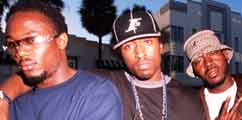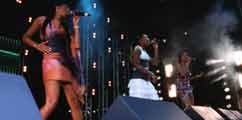 |
 |
So Solid
Crew
|
Mis-Teeq
|

|
Without reggae and how it
does things, it's unlikely the UK soul and dance music scene
would have developed in the way that it has. With Jamaicans,
for a long time making up half the total numbers of immigrants
to the UK from the Caribbean, that island's culture was always
going to have a massive effect on how black culture shaped
itself in Britain.
When sound systems established
themselves in London in the 1950s, they set a trend for how
black music should be enjoyed, both in terms of the rig's bass
capabilities, and also in the blues dance environment of late
night house parties or after-hours clubs. It wasn't unusual to
find sound systems built along reggae lines that played
nothing but soul and funk music — indeed the most famous of
these was Soul II Soul, who made the transition from reggae
sound system Jah Rico to their far more inclusive later
incarnation without losing their blues/dance
essence.
Likewise the rave culture of the late-1980s
that saw huge rigs playing all night in the open air, which is
more or less what Prince Buster and Coxsone were doing in
Kingston in the late 1950s.
When the UK started making
its own dance music, the dub and remix techniques and
bass-heavy sound balances of reggae dictated how things shaped
up — drum'n'bass didn't even bother to think up a new name for
itself. The later styles, jungle and UK garage, borrowed
heavily from dancehall in terms of attitude and presentation,
as they always worked hard to remain underground and show
themselves as aggressively exclusive.
But the real
influence came in terms of language and how UK MCs could
present themselves; rapping, in a false American accent always
sounded exactly like that — a false American accent — but
flowing lyrics in a streetwise, patois-drenched slang was
entirely natural. It freed the jungle MCs to be a lot more
creative with their lyrical delivery and subject matter as
they didn't have to concentrate on how they were talking,
something that prepared the way for UK garage and crews like
So Solid whose roots include dancehall.
|
|

